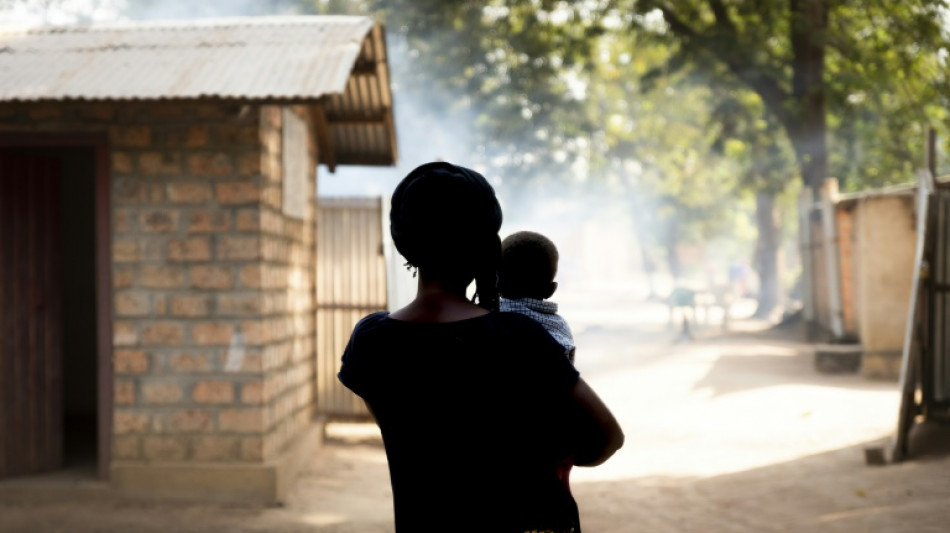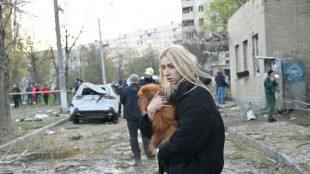
-
 SFWJ / Medcana Announces Strategic Expansion Into Australia With Acquisition of Cannabis Import and Distribution Licenses
SFWJ / Medcana Announces Strategic Expansion Into Australia With Acquisition of Cannabis Import and Distribution Licenses
-
Maresca confident he will survive Chelsea slump

-
 Mob beats to death man from persecuted Pakistan minority
Mob beats to death man from persecuted Pakistan minority
-
Lebanon says one killed in Israeli strike near Sidon

-
 Arsenal's Havertz could return for Champions League final
Arsenal's Havertz could return for Champions League final
-
US officials split on Ukraine truce prospects

-
 Client brain-dead after Paris cryotherapy session goes wrong
Client brain-dead after Paris cryotherapy session goes wrong
-
Flick demands answers from La Liga for 'joke' schedule

-
 'Maddest game' sums up Man Utd career for Maguire
'Maddest game' sums up Man Utd career for Maguire
-
Trial opens for students, journalists over Istanbul protests

-
 Gaza rescuers say Israeli strikes kill 24 after Hamas rejects truce proposal
Gaza rescuers say Israeli strikes kill 24 after Hamas rejects truce proposal
-
'Really stuck': Ukraine's EU accession drive stumbles

-
 'Not the time to discuss future', says Alonso amid Real Madrid links
'Not the time to discuss future', says Alonso amid Real Madrid links
-
74 killed in deadliest US attack on Yemen, Huthis say

-
 Southgate's ex-assistant Holland fired by Japan's Yokohama
Southgate's ex-assistant Holland fired by Japan's Yokohama
-
Vance meets Meloni in Rome before Easter at the Vatican

-
 Ryan Gosling to star in new 'Star Wars' film
Ryan Gosling to star in new 'Star Wars' film
-
Hamas calls for pressure to end Israel's aid block on Gaza

-
 Russia says Ukraine energy truce over, US mulls peace talks exit
Russia says Ukraine energy truce over, US mulls peace talks exit
-
58 killed in deadliest US strike on Yemen, Huthis say

-
 Museums rethink how the Holocaust should be shown
Museums rethink how the Holocaust should be shown
-
Three dead after deadly spring storm wreaks havoc in the Alps

-
 No need for big changes at Liverpool, says Slot
No need for big changes at Liverpool, says Slot
-
Bloody Philippine passion play sees final performance of veteran 'Jesus'

-
 New US envoy prays, delivers Trump 'peace' message at Western Wall
New US envoy prays, delivers Trump 'peace' message at Western Wall
-
Postecoglou sticking around 'a little longer' as Spurs show fight in Frankfurt

-
 US threatens to withdraw from Ukraine talks if no progress
US threatens to withdraw from Ukraine talks if no progress
-
Tears and defiance in Sumy as Russia batters Ukraine border city

-
 Russia rains missiles on Ukraine as US mulls ending truce efforts
Russia rains missiles on Ukraine as US mulls ending truce efforts
-
Tokyo leads gains in most Asian markets on trade deal hopes

-
 Two missing after deadly spring snowstorm wreaks havoc in the Alps
Two missing after deadly spring snowstorm wreaks havoc in the Alps
-
'War has taken everything': AFP reporter returns home to Khartoum

-
 US strikes on Yemen fuel port kill 38, Huthis say
US strikes on Yemen fuel port kill 38, Huthis say
-
Slegers targets Lyon scalp in pursuit of Arsenal European glory

-
 'Defend ourselves': Refugee girls in Kenya find strength in taekwondo
'Defend ourselves': Refugee girls in Kenya find strength in taekwondo
-
China's manufacturing backbone feels Trump trade war pinch

-
 Sri Lankans throng to Kandy for rare display of Buddhist relic
Sri Lankans throng to Kandy for rare display of Buddhist relic
-
Chinese vent anger at Trump's trade war with memes, mockery

-
 Heartbroken Brits abandon pets as living costs bite
Heartbroken Brits abandon pets as living costs bite
-
Mongolian LGBTQ youth fight for recognition through music, comedy

-
 Cash crunch leaves Syrians queueing for hours to collect salaries
Cash crunch leaves Syrians queueing for hours to collect salaries
-
Lyon left to regroup for Champions League bid after painful European exit

-
 Unravelling Real Madrid face Athletic Bilbao Liga test
Unravelling Real Madrid face Athletic Bilbao Liga test
-
Napoli disturbing buoyant Inter's peace in Serie A Easter bonanza

-
 Disappointed Dortmund chase consistency with Europe at stake
Disappointed Dortmund chase consistency with Europe at stake
-
Asian markets mixed as traders track tariff talks

-
 Yan and Buhai share lead at LA Championship
Yan and Buhai share lead at LA Championship
-
Under fire at debate, Canada PM Carney tries to focus on Trump

-
 Liverpool poised for Premier League coronation, Leicester, Ipswich for relegation
Liverpool poised for Premier League coronation, Leicester, Ipswich for relegation
-
India's elephant warning system tackles deadly conflict


Rape stalks women in C. Africa's dirty war
Maia looks down at her expanding belly, her eyes welling with tears.
Four months ago, an armed man grabbed and raped the 15-year-old, attacking her as she was harvesting cassava roots.
In the remote northwest of the Central African Republic (CAR), sexual violence targeting women, adolescents and even younger girls is on the rise.
Brutal acts are committed by rebels, militiamen and security forces alike, according to the United Nations.
In Paoua, about 500 kilometres (300 miles) northwest of the capital Bangui, more than a dozen rape victims turn up every day at a clinic run by the Danish Refugee Council (DRC).
The distraught teenager struggles to put her feelings into words. "I was alone in the fields when an armed man wearing a turban grabbed me," she says in a near-whisper.
"I told him I was a virgin and begged him not to hurt me," Maia says, unable to utter the word "rape", even as she bears the unborn child of the man who assaulted her.
Like Maia, Marie was harvesting cassava to feed her family when two armed men appeared.
Her husband fled the scene, but she reacted too slowly.
"They tied my hands, tore my clothes and took turns raping me," says the 23-year-old, who was wearing a traditional gown in the purple, green and white colours of International Women's Day.
The rape victims interviewed by AFP all had similar stories.
Most said they had been assaulted in the fields by rebels of a powerful local militia known as the 3R, a name derived from the French words for Return, Reclamation and Rehabilitation.
- 'Easy target' -
"In this area, it is mainly women who farm and take care of feeding the family," says Lola, an employee at the centre whose name has been changed for her safety, like Maia's and Marie's.
"Alone and helpless in the fields, they are an easy target for the rebels."
A civil war in the CAR that began in 2013, pitting myriad militias against a state on the verge of collapse, had lessened considerably in recent years.
But about a year ago, fighting resumed abruptly when rebels launched an offensive to overthrow President Faustin Archange Touadera.
At the time, armed groups controlled two-thirds of the CAR's territory.
But they ceded most of it when the army, backed by hundreds of Russian paramilitaries, mounted a massive counter-offensive against the rebels.
Today militia forces are confined to the countryside and have switched to guerrilla tactics -- and harassment and abuse of civilians are on the rise.
The UN Office for the Coordination of Humanitarian Affairs (OCHA) recorded 6,336 cases of gender-based violence between January and July 2021 across the deeply poor country.
The agency identified a quarter of such cases as sexual violence, an increase of 58 percent compared with the first half of 2020. Rebels and militiamen are more active in the Paoua region.
Recent reports by the United Nations or by UN-sponsored experts have accused both soldiers and their Russian mercenary allies of committing rapes.
At the Paoua hospital, signs prohibit the carrying of weapons.
A dozen women and girls wait outside a door freshly painted in pink to see Fabrice Clavaire Assana, a doctor who specialises in counseling and treating victims of gender-based violence.
"After a phase of listening and building confidence," Assana says, he carries out gynaecological examinations and provides emergency treatment when needed.
But his options are few.
The "morning-after" anti-pregnancy pill, hepatitis B vaccine and anti-HIV medicine work only if taken within 72 hours. "This is rarely the case," he says regretfully.
- 50km trek -
After Marie was assaulted, she turned first to relatives.
"I was distraught and ashamed. I first went to my in-laws in my torn clothes, but they were unable to pay for my transport to Paoua," she says.
So Marie then walked 50 km to Paoua, "praying" not to tread on a landmine or run into rebels.
"I relive the scene day and night, I can't go back to the fields," sighs Marie, burying her face in her hands.
"My husband has fled -- now I'm alone with two children to feed, and I can't grow crops."
Neither Maia nor Marie has tried to seek justice for the men who raped them.
Such crimes almost always go unpunished in the absence of functioning courts.
C.Garcia--AMWN